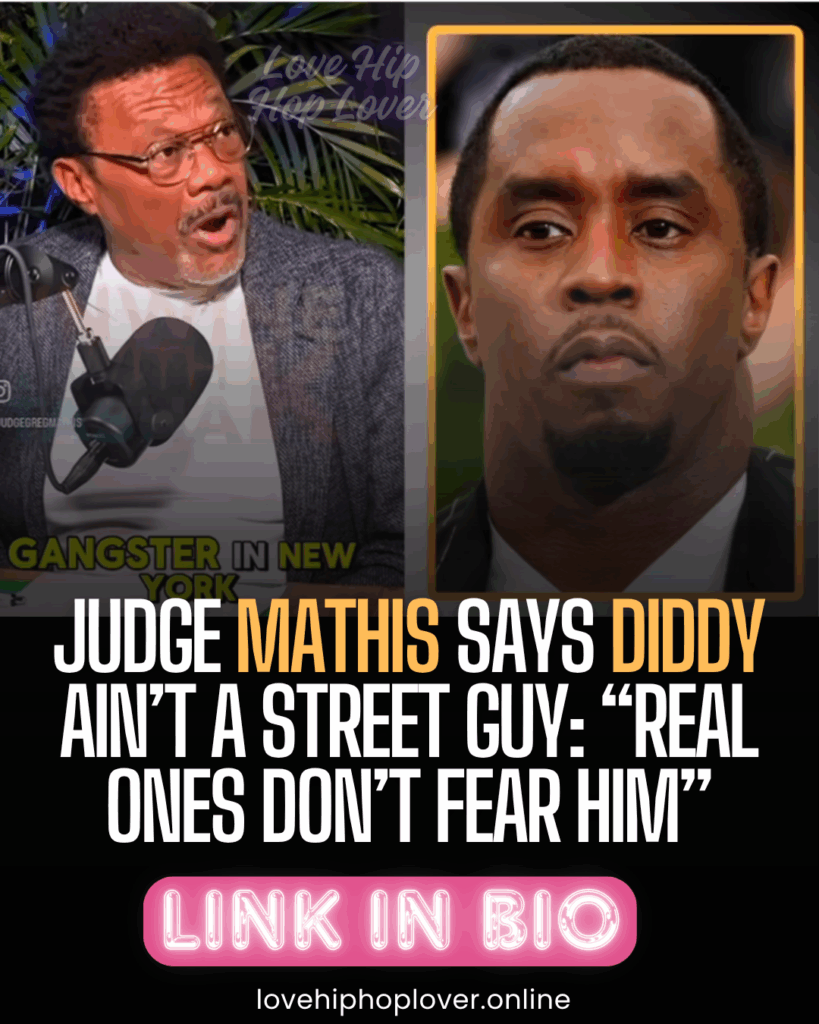Title: The former TV judge and community activist is speaking out to clear the air about Diddy’s true background

Judge Greg Mathis is not here for the smoke and mirrors—especially when it comes to Sean “Diddy” Combs and his long-standing “street kingpin” persona. The former TV judge and community activist is speaking out to clear the air about Diddy’s true background, and according to Mathis, the Bad Boy mogul’s tough guy image might be more performance than reality.
Let’s get into it, because Judge Mathis didn’t mince words.
Mathis: “Diddy Was Never in the Streets Himself”
During a recent appearance on a podcast interview, Judge Mathis addressed Diddy’s legacy, including the music, the power plays, and yes—the street rumors. But while Mathis gave Diddy his flowers for being a shrewd businessman and cultural tastemaker, he drew a sharp line when it came to Diddy’s credibility in the streets.
“Let’s be clear—Diddy was never a street guy. He came from that world through his family, yes. But he didn’t live it,” Mathis said.
“People may be scared of his temper now, but real street dudes? They don’t fear Puff.”
That statement alone was enough to send social media into a frenzy.
A Family with Street Ties, But That’s Where It Ends
Mathis didn’t deny that Diddy’s roots trace back to some very real—and very tragic—street connections. He acknowledged that Diddy’s father, Melvin Combs, was known in Harlem and reportedly involved in drug activity before being murdered when Diddy was just two years old.
But according to Mathis, Diddy didn’t follow that path.
“He was raised by a strong mother. He went to school. He worked hard in the music industry,” Mathis said. “He’s a businessman. That’s not the same as being a street dude.”
Diddy’s Recent Legal Troubles Spark Questions
The timing of Mathis’s comments comes amid increased scrutiny on Diddy, who is currently facing a wave of civil lawsuits and accusations—some involving alleged violence, manipulation, and criminal behavior within the industry.
Many people have long speculated about Diddy’s “mob boss” energy, pointing to his control over artists, fiery outbursts, and larger-than-life presence in the music game.
But Mathis’s take challenges that perception head-on:
“He might act tough. He might make folks nervous. But that’s not the same as living that street life,” Mathis said. “There’s a difference between having a temper and being about that life.”
Social Media Reacts: “So Is Diddy Cosplaying Street?”
Fans online are split down the middle. Some are siding with Judge Mathis, saying Diddy’s “gangsta image” has always felt more performative than authentic. Others feel Mathis is dismissing Diddy’s hard-earned respect in both music and business.
“Judge Mathis spilling FACTS. Diddy always gave ‘boss from the boardroom,’ not ‘block legend,’” one user tweeted.
“Let’s not act like power isn’t scary. You don’t have to be in the streets to be dangerous,” another argued.
Final Thoughts: Is Street Cred Still a Currency in 2025?
Judge Mathis’s comments spark a larger question about authenticity in hip-hop culture. In an era where being feared or respected often boosts an artist’s brand, the lines between street life and industry image are constantly being blurred.
But Mathis wants people to remember the difference.
“Let’s not confuse survival with performance,” he said. “Diddy’s a legend—but let’s be real about where he came from and what he’s about.”
So now the question is: do you agree with Judge Mathis?
Is Diddy’s legacy built more on affiliation than action? Or is his power alone enough to earn that street respect?
Sound off — the timeline is watching.